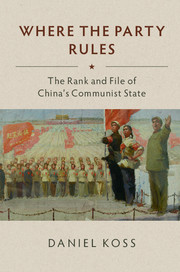Book contents
- Frontmatter
- Contents
- List of Figures
- List of Tables
- Acknowledgments
- PART I AUTOCRATIC GRASSROOTS POLITICS
- PART II THE PARTY IN CONTEMPORARY CHINA
- 3 The CCP as Co-enforcer of the One-Child Policy
- 4 The CCP's Support in Generating the State's Material Base
- PART III THE PARTY'S ORIGINS
- PART IV THE PARTY IN THE MAO ERA
- Appendix 1 Party-versus-Bureaucracy Model
- Appendix 2 Party Growth Model
- Notes
- Primary Material
- Secondary Sources
- Index
3 - The CCP as Co-enforcer of the One-Child Policy
from PART II - THE PARTY IN CONTEMPORARY CHINA
Published online by Cambridge University Press: 21 April 2018
- Frontmatter
- Contents
- List of Figures
- List of Tables
- Acknowledgments
- PART I AUTOCRATIC GRASSROOTS POLITICS
- PART II THE PARTY IN CONTEMPORARY CHINA
- 3 The CCP as Co-enforcer of the One-Child Policy
- 4 The CCP's Support in Generating the State's Material Base
- PART III THE PARTY'S ORIGINS
- PART IV THE PARTY IN THE MAO ERA
- Appendix 1 Party-versus-Bureaucracy Model
- Appendix 2 Party Growth Model
- Notes
- Primary Material
- Secondary Sources
- Index
Summary
China's recently abolished one-child policy was one of the most ambitious, successfully implemented government policies of the twentieth century. The stunning goal of Chinese family planning was to reduce fertility to about one birth per woman, down from five births per woman in the early 1970s. Along with the military draft, family planning stands out as an extremely intrusive manifestation of state power. In China, the one-child policy not only had to deal with strong preferences for multiple children, but also with deeply rooted expectations that every woman must give birth to a male inheritor of the family tradition, a goal that often puts tremendous pressure on couples to reproduce beyond the first, legal child. Exercising biopower over a diverse population of a billion people is a daunting enterprise. For political scientists, family planning is a fascinating phenomenon, where the party state has managed to extract compliance with a policy that – even if ultimately it may be for the common good – clashes with citizens’ individual preferences. Whether one approves of family planning or whether one objects to it, it has been a spectacular display of state power.
The case of the one-child policy exemplifies, in one critical policy area, the role of the CCP's local membership for policy enforcement at the grassroots level. Given the high political priority of the one-child policy, it is to be expected that the party state deploys its most powerful tools to ensure smooth implementation – and as this book argues, the party's rank and file are an essential instrument in the state's toolbox. In sync with the following chapter on tax extraction, this chapter provides evidence that the Leninist apparatus empowers the Chinese state throughout its realm. Moreover, the one-child policy provides an opportunity to clarify – analytically and empirically – the separation of party and state. Far from being a formality without substantial implications, the party and the government remain distinct institutions with distinct functions. The boundary separating the two has evolved over time as the result of discrete choices, which have resulted in a relatively efficient design.
- Type
- Chapter
- Information
- Where the Party RulesThe Rank and File of China's Communist State, pp. 85 - 123Publisher: Cambridge University PressPrint publication year: 2018

